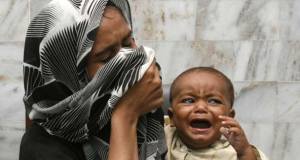 Eighteen people were suffocated to death during a stampede in Karachi, Pakistan on Monday as poverty-stricken women battled for a free bag of flour being distributed by a philanthropist in Khohri Garden. The dead reportedly include a number of children as well.
Eighteen people were suffocated to death during a stampede in Karachi, Pakistan on Monday as poverty-stricken women battled for a free bag of flour being distributed by a philanthropist in Khohri Garden. The dead reportedly include a number of children as well.
‘I would have never come here to get flour if the inflation rate was not as high. The price hike this year has made it difficult for us to feed our large families and the government does not seem to care. Every day I stand in long queues to purchase atta (flour) at Rs10 per kg, but return home empty-handed. Today, when I heard that free flour was being distributed by someone, I immediately rushed to try my luck here as well,’ said Amina, a maid at a government school in Lyari.
‘As soon as I reached out to get a bag of flour, two women jumped on my back and I fell down. The crowd stepped on me and I couldn’t breathe for a while and then fell unconscious. My neighbour brought me to the hospital.’
Amina added that although this is her yearly routine, the turnout of women in bachat bazaars is much more this Ramazan. ‘I don’t just have my family to feed but that of my sisters as well who are widows and live with me. I visit these bachat bazaars every year to buy essentials at subsidised rates and end up making a lot of friends as I stand in a queue.’
Since men are away from home during the day, it is mostly women who end up spending most of their day outside utility stores. When asked if she would think of heading to a free ration stall after Monday’s episode, Amina said: ‘Yes I will. It is the woman’s responsibility to look after the family. And I will do anything to feed my children,
even if I have to risk my life.’
